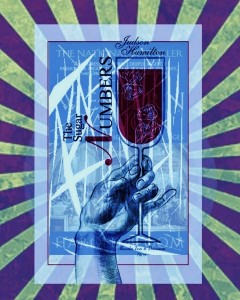25 Points: Wolf in White Van
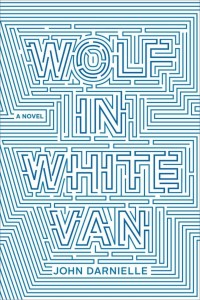 |
Wolf in White Van
by John Darnielle
Farrar, Straus and Giroux, 2014
224 pages / $24.00 buy from Amazon
|
1. I don’t like writing. The actual act of writing, I mean. It’s hard to get started. Just getting this first of twenty-five points written took longer than the next twenty-four.
2. I like better having written, when there’s a mess of text on the page to play with. It’s not really creating anymore at that point; it’s discovery, exploring. Moving around in it and finding what I might have missed the first time.
3. John Darnielle’s Wolf in White Van is a book about a lot of things. Mostly, though, it’s about exactly this kind of discovery and exploring that appeals to me. Discovery through text, exploring between your ears. Imagined mountains, dreamt-up spaces.
4. “It gets so lonely living inside your own head,” writes the narrator, as way of explanation for having dreamt up one particularly dangerous space. The book centers on this hero’s reasons for—and the consequences of—dreaming up a game called Trace Italian.
5. Trace Italian is a by-mail role-playing game of sorts. “The way you play Trace Italian,” the narrator tells us, “seems unbearably quaint from a modern perspective, and people usually don’t believe me when I tell them it’s how I supplement my monthly insurance checks, but people underestimate just how starved everybody is for some magic pathway back into childhood.”
6. “A magic pathway back into childhood” is a better way of describing what this book is about. Memory, remembering. Finding the path back to a place where anything is possible.
7. It’s just the kind of book I like best.
8. I’m so glad this book isn’t called Trace Italian.
9. The “monthly insurance” checks the narrator mentions in point 5 above are part of the mystery of the book. What exactly happened that led this person to create a game and collect insurance checks? What caused him to live sequestered from the world? Why does he order swords from a catalog? Real, honest-to-god swords?
10. Players begin Trace Italian by sending an SASE to a PO Box and receiving in turn a sheet of paper telling them where they are in the imagined world. It’s a post-event world of sorts; they must traverse a landscape toward an end goal, the Trace, where they’ll find safety from the bad things that have taken over.
September 30th, 2014 / 2:50 pm
In Defence of 4chan
There’s a message being conveyed by mainstream journalists and clickbait sites alike that 4chan hates women. This is true to the extent that 4chan hates everybody. 4chan hates 9GAG and Reddit, which are in many ways its direct descendants. It hates My Little Pony: Friendship is Magic culture, even though it has an entire “containment board” dedicated to it. 4chan will most likely hate me for writing this post. 4chan, as one local Fox News station stated, is “an Internet hate machine.” And you’re just going to have to deal with that.
I started visiting 4chan after reading Parmy Olson’s excellent book We Are Anonymous: Inside the Hacker World of LulzSec, Anonymous, and the Global Cyber Insurgency. At first I didn’t know what to make of it. User friendliness and design function were not priorities for founder Christopher Poole when he created the site as a 15 year old. Nor are 4channers welcoming of newcomers. When there’s an influx of new users, which happens every summer, or after a big media event like the fappening, the /b/ros get busy posting beheadings, coprophagiac gifs, and all manner of hair-raising content.
Rachel Jensen’s Free Junk: The ghost of a flea
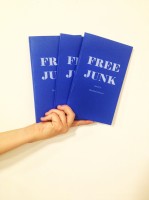 Free Junk
Free Junk
by Rachel Jensen
Snoot Books
$10 / Buy from Snoot Books
Perhaps the most recent tie between humor and gloom is the suicide of Robin Williams. Yet, the examples are plenty: comedian Mitch Hedburg—”My fake plants died because I did not pretend to water them,” was reported dead due to drug overdose; addiction invariably traces to depression. Sarah Silverman jokes about her ups and downs, “I am diagnosed with not having enough insanely-addictive drugs coursing through my body.” Maria Bamford, Google her. And Shakespeare, that guy, he divided his mojo between comedy and tragedy. I think of this waltz of contrasting sentiments when I read Rachael Jensen’s chapbook, Free Junk. Jensen’s poems can be comically-surreal and bearers of realistic insight. She provides details that make me want to laugh-weep. Ironic, romantic, yucky, naive, searching—she’s got as many voices as a self-help hotline on Valentine’s Day night.
For starters, Free Junk allows itself the liberty to be bizarre. Despite whatever “junk” the poems begin with, they have confidence that they will end up somewhere meaningful or at least where they need to go. Here is a list of first lines:
in a bush: Levi’s classic fit denim,
Once, a stranger sent me a message on the Internet
to tell me she dreamed I gave birth to a kitten. I responded,
I like marshmallows over an open flame.
I heard ‘toaster dream’
We begin with found, odd and banal things, sometimes misunderstandings. Whatever the particular point of entry, the peculiarity is fetching. I am intrigued to see where the poem could go, and Jensen manages to find her way: classic fit Levi’s washed and dried throughout the night become a drunken loneliness, self-satisfied and clad in “victim shorts”; an internet message about cat-birthing yields cat-water-holding which funnels into an inquiry regarding the nature of a priori knowledge. I think of another recently-dead person, Russell Edson, his surreal miniature fables. I also remember what a classmate told me once during a workshop: “It’s hip to include whatever you can in a poem.” That lady was right; it is hip to include gallbladder stuffed animals in poems, but as Mitch Hedburg once postulated, “Is a hippopotamus a hippopotamus, or just a really cool Opotamus?” Free Junk has the opotamus, too. The chapbook engages with the trend, but the poems are grounded by their odd specificity and drift into profundity.
Free Junk plays with romance, too. It romances, playfully. There is a brunette lament: READ MORE >
September 29th, 2014 / 10:00 am
Stella Corso
PERFECT PERSON
and when I laid my hands upon his person
I thought this is the perfect person
and so was stricken
and became nauseous
then he asked me for money
and I was honored
I felt flattered
and when his freedom finally leaked
I thought how terrifying
how torturous
and was touched again
everyone around us grew disgusted
I leaned over
and threw up into their milk
Bio: Stella Corso lives in the Pioneer Valley where she runs a vintage clothing shop called Pale Circus and teaches at Western New England University. Some of her poems can be found in Coconut Magazine, jubilat, Caketrain, notnostrums and Everyday Genius. She is a founding member of the Connecticut River Valley Poet’s Theater, also known as CRVPT.
I Loved You More by Tom Spanbauer
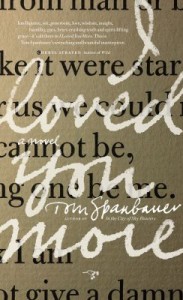 I Loved You More
I Loved You More
by Tom Spanbauer
Hawthorne Books, April 2014
468 pages / $18.95 Buy from Amazon or Hawthorne Books
I Loved You More by Tom Spanbauer starts with a slow burn, like an acid trip, of which there are a few in the book: There’s a preliminary period of seemingly aimless hanging out, and just when you start thinking nothing is going to happen, the room lights up, your heart lurches, and everything begins to glow.
Other writers have tried to quantify the transformation that occurs reading Spanbauer’s writing, the feeling of truth as opposed to artifice, the sense that now we’re really talking. The closest I can come is that it felt like letting air and light into a dark room. The book’s narrator, Ben Gruneberg says it much better, “When you get close to the vein that’s pulsing truth, when you open that vein, you can scrub your soul clean with the blood.”
Spanbauer is known for his truth-telling and open veins. He’s a gay writer and creative-writing teacher in Portland, Oregon, one of the gang of Portland writers of whom Cheryl Strayed and Chuck Palahniuk are the most famous, and Lidia Yuknavitch is the most beloved to me, personally. (Though, I don’t know if all these people are really a gang, or if that’s an outsider’s perception; I’m calling a Portland School, and assuming Spanbauer is a founder.) His Wikipedia entry says that he’s been living with AIDS since the 90s, and his AIDS book, In the City of Shy Hunters is a literary classic.
This latest novel, I Loved You More, published by Hawthorne Press in April 2014, is also a gay coming-of-age story, a living-with-AIDS story, and a story about male friendship, which seems to be mostly autobiographical. In it, Spanbauer’s alter ego, Ben Gruneberg—like Spanbauer, a writer and writing teacher with the same basic points of biography—chronicles his lifelong friendship with a straight male writer, Hank Christian, and the explosive end of that relationship. A bit of Google-digging will reveal a possible candidate for the real-life model of Hank.
On one level, it’s not a particularly dramatic story—a love triangle! featuring three writers! in Portland! and a pot of kale!—and how it all ends is mostly revealed on the first page. Moreover friendship is usually a side-story, not a main event, and devoting a book to the demise of one feels odd. The first section takes place in New York in the late 80s, when Ben and Hank are young writers at Columbia, studying under a fictionalized version of Gordon Lish, and their hanging-out, and the importance Spanbauer imbued it with, took a while to seize hold of me. And then it did.
Part of the alienation and then the magic is Spanbauer’s prose style, which is beatnik-ish in an old-fashioned way, using slang and refrains, a lot of fucking this or fucking that, man. His sentences are unconventional and fragmentary: “That old litany in this strange new place, how it made my heart stop.” Or this description of a leather bar: “In front of us, three men deep. Beyond, the bar is dark. Smoky dark. A foggy night, an ocean of men, dark waves. They have a sound, the waves, here and there bursts of pirate laughter, then no laughter.”
September 26th, 2014 / 10:00 am
JUDSON HAMILTON: Why Shld I Read YOUR Book ??

ok, Judson, so why should we read YOUR book ???
Let me answer your question by way of analogy, I had a dream recently, in which I asked Ashbery to look after my two kids and when I came back they were parked in front of the TV in the living room, seemingly unharmed. I looked around and found Ashbery clad only in a pair of tidy whities rolling around laughing on the bed, deep in conversation with a woman in her 70s, an old friend apparently. They were lost in reminiscence, they’re faces lit up with the joy of nostalgia, and I didn’t have the heart to be angry with him.
Then he jumped up and joyfully began to pop lock, like in some shitty kid’s video,with electric cutout arms blinking blue, red, yellow and that pretty much sums up how I feel about this book. It’s surprising, delightful and absurd.
To answer your question by way of digression, about 6/7 years ago I started receiving emails that looked as though somebody had fed the better portion of the western canon through a shredder and then affixed it to emails, I assume to bypass the spam filter. I liked some of the initial juxtapositions that turned up and began playing around with the text, and while I was doing that, a narrative emerged from the depths in the form of: a Speed-hearing Judge, his brother the Duke of Marmalade and, Morel and Valentine, the two servants trying to overthrow them.
Look, I know Syria’s been forgotten and the Congo’s a mess and let’s be honest who needs another book-length absurdist narrative on their bookshelf, am I right? But we’re all doing what we can and together we can right this ship…. that and the e-book version shouldn’t cost you more than a trip to the taco truck, so what’ve you got to lose?
(Judson Hamilton 9/2014, Poland)
25 Points: Mother of a Machine Gun
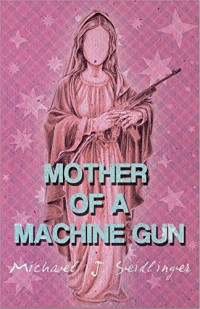 |
Mother of a Machine Gun
by Michael J. Seidlinger
Lazy Fascist Press, 2014
100 pages / $7.95 buy from Amazon
|
1. When I first read the title, I pondered the possibility of an automatic weapon being successfully birthed from a woman’s vagina. (Pretty sure your genitalia would never be the same.)
2. The writing style of Mother of a Machine Gun reminded me of some strange Dr. Seuss book I read as a child.
3. Michael J. Seidlinger is a fucked up Dr. Seuss.
4. Kind of wonder if Seidlinger’s mother has read Mother of a Machine Gun and whether or not she thought it should be “critically acclaimed.”
5. Pondered the economic and environmental costs of having so many one-line paragraphs.
6. To go along with point #5, probably should’ve put in pictures or something to fill in the vast amount of white space.
7. To go along with points #5 and #6, the vast amount of white space and one-line paragraphs make for a quick read. (Could be a positive or negative thing depending on whether or not you like the book.)
8. Mother of a Machine Gun is a story of denial.
9. Mother sucks at being a mother.
10. Mother probably shouldn’t be left to go on a crusade to find her son.
September 25th, 2014 / 4:30 pm
25 Points: The Road to Emmaus: Poems
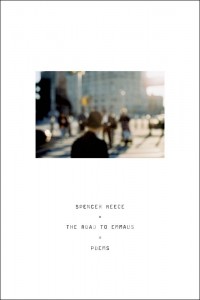 |
The Road to Emmaus: Poems
by Spencer Reece
Farrar, Straus and Giroux, 2014
144 pages / $24.00 buy from Amazon
|
1. I have always had a thing for men of God.
2. Spencer Reece is an Episcopalian minister. Do not let this turn you off. If you do, you will be doing yourself a great disservice. You will be denying yourself something sight unseen.
3. The priest at my father’s funeral was a radical one. His name was Father Pat, and he was a notorious IRA sympathizer. At the service, Father Pat was treated like a rock star. At his own funeral, my father was upstaged.
4. Reece did not become a minister until he was 48 years old. It took him eleven years to write the poems in The Road to Emmaus. I find this to be strangely reassuring; I always feel like I am rushing, trying to make up for lost time.
5. In 2010, Reece served at the only all-girl orphanage in Honduras, Our Little Roses, in San Pedro Sula. San Pedro Sula is the murder capital of the world. At a reading from this book that I attended last week, Reece told a story of a friend’s attempt to raise money for the orphanage from a wealthy benefactress. The woman agreed to make the donation, saying, “How else will Honduras get its maids and prostitutes?”
6. A year after my father’s death, Father Pat was arrested for laundering money for weapons to the IRA.
7. The Road to Emmaus refers to a story in the Gospel of Luke where Jesus makes an appearance to two of his disciples as they leave Jerusalem for the city of Emmaus, two days after Jesus’ crucifixion. The two disciples are leaving Jerusalem, perhaps for good, because of the events surrounding Jesus’ death. A man appears to the disciples on the road; he does not identify himself, and the disciples don’t recognize him. Instead, as he walks with them, the man corrects their misinterpretations about what has transpired; telling them it was all in line with God’s plan. Still not recognizing the man as Jesus, the disciples invite him to eat with them. Later, when they finally recognize him as Jesus, he disappears.
8. Reece describes himself as coming to religion “tentatively.” He told the Poetry Society of America that he feels a connection to T.S Eliot, who was also devout. Like Eliot, many of Reece’s poems mix verse with prose. “When I try to write, his example is never far from my mind. At times, I’d like to think I am in conversation with him,” Reece has said.
9. I have dreamed in lyrics from “Me and Julio Down by the School Yard.” And when the radical priest comes to get me released...I blame the Berrigan Brothers.
10. The story of Reece’s road to publication is oft-repeated. He wrote for over two decades, mostly alone, sometimes while living in farm house/ bird sanctuary in Minnesota, publishing only a handful of poems over that time. He sent out the manuscript for his first book of poetry, The Clerk’s Tale, to over 250 first- book contests without success. In 2003, he won the Bakeless Poetry Prize, judged that year by Poet Laureate Louise Glück. The title poem from The Clerk’s Tale was made into a short film by James Franco while Franco was a student at NYU. The poem is a story of the day in the life of Reece, and an older gay co-worker, as they go about their work day at a Brooks Brothers in the Mall of America.
September 23rd, 2014 / 1:56 pm
Dan by Joanna Ruocco
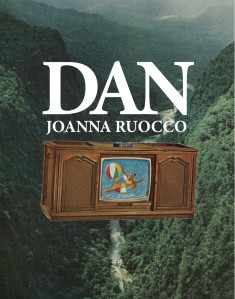 Dan
Dan
by Joanna Ruocco
Dorothy, A Publishing Project, Oct. 2014
152 pages / $16 Buy from Dorothy or Amazon
Joanna Ruocco is a word wonder maker and in Ruocco’s newest novel, Dan (due out from Dorothy, A Publishing Project Oct. 1st) she has managed to not only build unbelievable structures with words but to also build an actual city. This city is Dan. And it is a place we have been before. Or maybe we haven’t. It’s a place shoved so far back into the recesses of the mind that only through reading her words do we realize that those feelings, the emotions she constructs, are already within. Reading Dan is like having a bot worm medically expelled from your body. You suspected there was something wrong, something in you that wasn’t right, and by mysterious ways of medical linguistics Ruocco has not only identified the parasite, but found it in the deep recesses of your soul and pulled it out through your tear ducts for you to see and examine. Or perhaps reading Dan is more like the act of having your ears cleaned. With each page a tube is stuck deeper within your drum and Dan mounts, pushing warm alien water into your skull, pulling out chunks of orange gunk so big you end up questioning your true size. I conceived my ear canal to be X size. But, my god, my ear canal is triple X. And dear lord can I hear better. After reading Dan you’ll hear things in the way you speak, in the way others speak, that you simply did not hear before.
Within the narrative many of these linguistic nuggets come by way of male characters giving of prescriptive advice. Our protagonist’s father, Zeno Zuzzo, looks over at a group of loitering ladies and warns:
“Do you see the ears?…Those women are conspiring, always conspiring. Why else would they need ears so close to their mouths? They’re whispering things to themselves, Melba. They’re stirring themselves up.”
These bizarre, otherworldly observations are gifted to us throughout. They are occurrences that could only take place in Dan, or are perhaps what make up Dan itself.
Thus Ruocco leads us inside ourselves by way of location. Dan is a small male-heavy hamlet in the middle of somewhere. The residents of Dan know of nowhere. Or maybe there is nowhere else. Some residents do leave, but they don’t so much leave as disappear. Our charismatic protagonist, Melba Zuzzo, for a period of time thought Dan was island. And maybe it is. Or maybe isn’t. In Dan, things are turned not upside down, but sideways, just tilted enough so we can recognize them. The only other female we meet in Dan is Melba’s mother, Gigi Zuzzo, who tirelessly requests the absurd. Melba, did you have the hair on your forearms removed? When was the last time you went shopping? Gigi Zuzzo says, Melba you do not shop enough and this will be the end of you. How else is one to expand their horizons except by way of consumerism? The conversations that Melba has with Gigi, like all the conversations Melba has, are at once absurd but intimately familiar. Have I had this conversation with my mother before? Yes. Did she ask me to remove the hair from my forearms? No. But everything else was the same. The cadence, the rhythm, the sudden carping turn. It’s like Ruocco has been eavesdropping on me and my mother my entire life, and given my conversations back to me in Dan, de-familiarizing them just enough for me to recognize them.
September 22nd, 2014 / 10:00 am
Niina Pollari
Vampire
I am a vampire in a grayly coughing dawn
I prepare a ritual of the hallucinogenic sleep
I lay down and spread
My gnatted arms by my sides
I cannot
But let
An Autobahn of blood be mealy in me
You know what I mean
We king our impulses, love
Eat and prey
Every day
It’s a fakey arcade
And I am its operator laughing copper with blood in my teeth
I spin a bright novelty ball on my finger
While I watch you watch me
I can’t make myself be alive
I do not feel sorry
I only talk about me
the laptop shudders violently when I type my About Me
You ask if I will stay here in the ruin
With you, and of course I will
When I say those words exactly
I let them rope out of my mouth
And twine around my fingers
What I do is a conjunction
I smooth the gothic filament of my agreeing
And I close my eyes
And how an hourglass is wide on both ends
But wide enough in the center for one grain only
That image is my voice
Working in my throat
I use it to gorge you
With my gentle introduction
“I can smell you
It’s nice and I like it
Did you know that I am real”
Bio: Niina Pollari’s first book Dead Horse will come out from Birds Llc in November. She coordinates Popsickle, a yearly, traditionally sweaty mega reading in Brooklyn.

